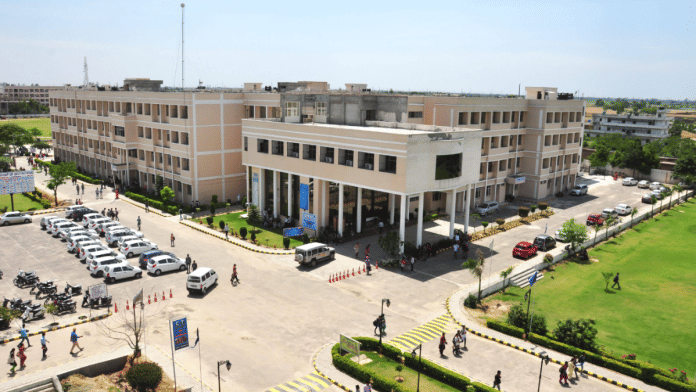New Delhi: A Mohali court Thursday rejected the bail pleas of four suspected members of the terrorist outfit Ansar Ghazwat-ul-Hind, more than seven years after they were arrested from a hostel room of an engineering college in Jalandhar with arms and ammunition.
One of the accused, Yasir Rafiq Bhat, arrested in October 2018, is the cousin of the outfit’s slain chief, Zakir Musa.
The outfit came under spotlight once again earlier this week, when J&K Police invoked AGuH as the inspiration for the terror module that was behind the blast near Red Fort in New Delhi.
“In a major Counter Terrorism success, J&K Police has busted an inter-state and transnational terror module, linked with proscribed terrorist organizations, Jaish-e-Mohammad (JeM) and Ansar Ghazwat-ul-Hind (AGuH). The operation has led to the arrest of key operatives and recovery of a massive cache of arms, ammunition and explosives, during coordinated searches in J&K and other states,” the Jammu and Kashmir Police had said Monday after busting the Faridabad terror module.
Since the bust, investigators found that a group of doctors at a Faridabad college was allegedly recruited for planning and carrying out terror attacks in India. Two of doctors, Muzammil Shakeel and Shaheen Saeed, were arrested, while a third, Umar-ul-Nabi, escaped police raids and allegedly drove the explosive-laden car outside Red Fort in Delhi, killing at least 12 people.
The Jalandhar module
Acting on intelligence inputs from Jammu and Kashmir Police, Punjab Police raided room number 94 of the hostel at CT Institute of Engineering, Management and Technology in Jalandhar on 10 October, 2018. They recovered one AK rifle with two magazines and 54 live rounds, one Mauser pistol with two magazines and 31 live rounds, and incendiary material weighing about one kilogram.
Three men—Zahid Gulzar, Yasir Rafiq Bhat and Mohammad Idrish Shah—all from J&K, were taken into custody from the college campus. The next day, a fourth accused, Suhail Ahmed Bhat, was arrested on charges of recruiting cadres for AGH and conducting reconnaissance for attacks.
The case was transferred to the National Investigation Agency (NIA), which charged all four men. According to the NIA, Rafiq Bhat played an important role in the procurement and safe storage of explosives and in motivating students from Kashmir at the Jalandhar engineering college to join AGuH.
The NIA probe revealed that Rafiq Bhat guided the other two accused, Zahid Gulzar and Idrish Shah, in receiving arms from Amritsar and handed over Rs 1,000 for their travel expenses days before their arrest.
The investigation also found that Rafiq Bhat had received prior information about a grenade attack on Moqsudan police station in Jalandhar from his cousin, AGuH chief Musa, on Telegram mobile application.
Following this, he moved arms and ammunition from their rooms to room number 11 in another block of the hostel building.
On Suhail Ahmed Bhat, NIA alleged in the chargesheet, he personally recruited Zahid Gulzar into the module run by AGuH chief Musa. On Musa’s directions, Suhail allegedly attempted to throw grenades at the Sector 43 bus stand in Chandigarh and Dera Bassi police station in Mohali in July 2018.
Formed as a Kashmir-based affiliate of Al-Qaeda in the Indian subcontinent, AGuH was first led by Zakir Musa in Kashmir. Musa was killed in an encounter in May 2019.
A couple of months later, Hameed Lelhari, alias Haroon Abbas, was appointed as the next chief. Lelhari was also killed in an encounter in October 2019, prompting the then Jammu and Kashmir Police director general Dilbag Singh to declare that the outfit was “wiped out” of the valley.
Court’s observations
Appearing for the accused, Advocate Balbir Singh Saini argued that denying bail to them would violate their fundamental rights as the prosecution witnesses had failed “miserably” to establish their role in the case.
Special Public Prosecutor Lokesh Narang, representing the agency and opposing the bail pleas, said it would be premature to evaluate the evidence at the stage of bail application.
Rejecting the bail pleas of all four accused on Thursday, special NIA judge Dinesh Kumar Wadhwa in Mohali observed: “In the present case, the material available on record prima faciely points out towards the involvement of the applicant in commission of crime pursuant to his conspiracy with other co-accused backed by the banned terrorist organisation. There exists prima facie material against the accused, as arms, ammunition and explosive substances were recovered form his and co-accused possession.”
Also Read: Red Fort blast echoes 2011 Delhi HC bombing—’white-collar’ terror cell, doctors & Jaish footprint






